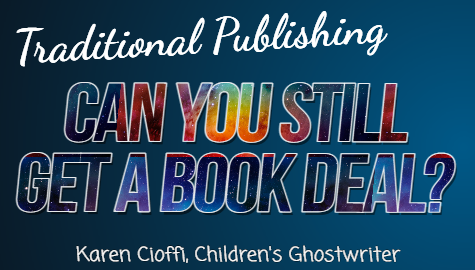A few years ago, I read an interesting article at Books and Such titled, “Meaning of Persistence.”
I’ve written about this topic before. The writer who perseveres is the one who becomes traditionally published.
With the ever-increasing ease of self-publishing, A LOT of authors are foregoing the traditional path for one that’s easier and much quicker, albeit the more expensive path.
Another reason authors, especially new ones, take the self-publishing road is the difficulty of getting a traditional contract. This difficulty is amplified if the author is trying for the Big 5 (the five major publishers).
Okay, back to the article at Books and Such. The gist of the article is that if new authors weren’t getting book deals, then why would agents still accept queries?
The same goes for book publishers. The article gives authors hope.
This is not to say the road won’t be littered with rejections, time, and effort. But a traditional book deal is still possible.
If you’re persistent and keep researching agents and publishers who are accepting manuscripts in the genre you’re writing, and keep submitting, you just never know.
Chicken Soup for the Soul had a rough road. The authors, Jack Canfield and Mark Victor Hansen, had 144 rejections before they got a contract with a small publisher in Florida.
This is where perseverance comes in. What if they gave up at 100 rejections or 130?
While perseverance and persistence is a must, authors need to know how the publishing game has changed. The industry has evolved, and you need to know what publishers are looking for now.
WHAT TO EXPECT AND STEPS TO TAKE
- Publishers are More Cautious.
Post-pandemic budgets, the surge of self-publishing, and a competitive digital market mean fewer risks are being taken on unknown names. Because of this, you need to be strategic.
- Manuscripts Must be Ready to Pitch.
Editors are flooded with submissions; they’re overworked. They’re looking for that mistake, sloppiness, anything to show you have taken the time to do it right.
To get past the gatekeeper, your manuscript needs strong concept and sense of genre. It needs ‘clean prose.’
Editors are looking for market potential. They want a polished manuscript that will be a great book.
You need to know your audience, understand comparable titles, and show how your book fits in and stands out.
- Platforms: Yes, No, Maybe.
If you write nonfiction, a platform is a must. But what about fiction?
If you write fiction, having a platform isn’t as essential, but you still need to show that you have marketing ‘reach.’ You need to be visible and help your book succeed.
Publishers look at things like an author’s engagement in a niche community, short fiction credits in reputable magazines, and a popular Substack.
It’s no longer a matter of having a lot of social media followers; it’s about putting in the work to be the type of author a publishing house will want to have on board.
- Seek Representation with an Agent
Most big publishers still require submissions through agents. And agents are looking for the same things editors do: a marketable manuscript, a professional attitude, and a writer who understands the business.
As with publishers, querying is very competitive, but writers still sign with agents every day—research agents who represent your genre. Personalize your query. Follow guidelines. And revise, revise, revise.
- Look Into Smaller Publishing Companies
Small presses are a great option. They’re much more willing to accept unknown authors, unagented submissions, and unique voices. This is the route I took; my books were published through a small publisher.
Do the research and find small publishers that publish in the genre you write in, and follow all guidelines.
I have an article at Writers Digest, The Pro and Cons of Publishing with a Small Publisher, that you might find interesting.
WHAT TO DO IF YOU GET REJECTIONS
If you keep getting rejections, you might reevaluate your manuscript. Research the type of books that are getting contracts in your genre.
You might join a critique group. Having those extra set of eyes is an amazing help. You might also let a professional editor in the genre you write review your manuscript.
SUMMING IT UP
It won’t be easy. The publishing industry has always been slow, subjective, and full of rejections. But those who work within it love good stories and are always searching for the next great book.
So, while the journey may be rough, getting a publishing contract is still doable. Persevere and be persistent, and while you’re submitting and waiting for your big break, start another book.
Sources:
https://www.chickensoup.com/about/history

I’m a working children’s ghostwriter, rewriter, and coach. I can help turn your story into a book you’ll be proud to be the author of, one that’s publishable and marketable.
OTHER HELP I OFFER:
HOW TO WRITE A CHILDREN'S FICTION BOOK
A DIY book to help you write your own children’s book.
FICTION WRITING FOR CHILDREN eCOURSE
4-Weeks / 8 Sections Guided Self-Study Mentoring Program
You can contact me at kcioffiventrice@gmail.com.

The Author Website – Do You Really Need One?
Picture Books – Story or Illustrations, Which Comes First?
Writing Procrastination: IF and WHEN Were Planted and Nothing Grew (Tips to Overcome Writing Procrastination)

